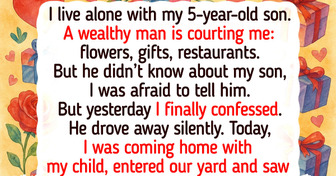Stepmom Shuts Out 7-Year-Old From Family Tradition—Dad Refuses to Stay Silent
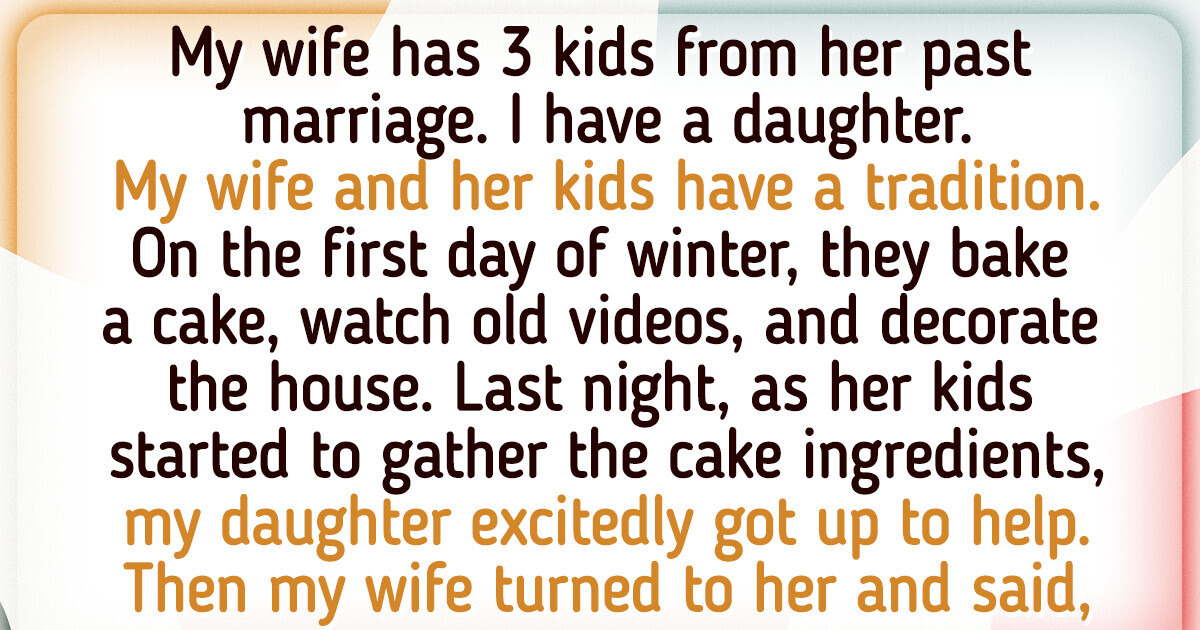
Blended families are supposed to come together, but what happens when one child is pushed aside? A father who has embraced his wife’s children as his own is now faced with a painful truth—his wife does not see his daughter the same way.
When a family tradition turned into a moment of rejection, he could no longer ignore the signs. Should he fight for change or walk away to protect his daughter? Is he overreacting, or is this the moment he finally sees the truth?
We've been married for 5 years. My wife has 3 kids from her past marriage—two daughters (15 and 13) and a son (11). I have my own daughter, Anna, who’s 7.
Since day one, I’ve treated her kids as my own, providing for them, supporting them, and making sure they never feel like they’re anything less than family. Lately, I realized that my wife hasn’t extended that same effort to my daughter.
It’s subtle—she’s never outright cruel, but it’s in the way she barely acknowledges her. She asks her kids how their day was, checks in on their homework, and makes their favorite snacks.
But when it comes to Anna, she barely says a word. If she talks, my wife nods absently, like she’s just waiting for her to stop. I’ve tried to convince myself that I’m imagining it, that they just need more time to bond. But last night shattered the illusion.
Every year, my wife and her kids have a tradition. On the first day of winter, they bake a special cake, watch old home videos, and decorate the house together. Last night, as we finished dinner and her kids started gathering the ingredients for the cake, my daughter excitedly got up to help.
Then my wife turned to her and said, “Get up to your room. This is something I do with MY kids. Maybe you and your dad can have your own tradition.” Anna’s face fell. She mumbled, “Oh, okay,” and went to her room.
I sat there frozen, my heart pounding. After a few minutes, I followed her. She was curled up on her bed, staring at the wall. I asked if she was okay, and she just shrugged.
That was enough for me. I went back downstairs, pulled my wife aside, and told her she had just made my daughter feel like an outsider in her own home.
She got defensive, saying it wasn’t a big deal, that it was just a small thing she and her kids have always done. I told her that traditions evolve when families change, and that she had just made it clear that she doesn’t see Anna as part of hers. She rolled her eyes and said I was “looking for a fight.”
I told her I wasn’t looking for anything—I was seeing it clearly for the first time. She treats my daughter like a guest in this house, while I’ve done everything to make hers feel like mine. I told her I wouldn’t stand by and watch my daughter be pushed aside like she didn’t matter.
My wife accused me of blowing things out of proportion and making her feel like a bad person. But I can’t unsee what I saw. I can’t unfeel the hurt in my daughter’s eyes. I'm seriously considering a divorce.
Am I wrong for calling my wife out?
Frank
Dear Frank,
You are absolutely NOT wrong for calling your wife out on this. In fact, you did exactly what a loving and protective parent should do—stand up for your child when she’s being treated unfairly.
What happened that night wasn’t just a small oversight; it was a clear exclusion of your daughter from a family tradition, a moment that sent a painful message: “You don’t belong.” Your wife’s response is especially concerning. Instead of recognizing the hurt she caused, she dismissed your feelings and made herself the victim. That’s not a misunderstanding—that’s a refusal to take responsibility.

I was in the same situation and it just got worse and I ended up ending my relationship but my wife but she did not leave my house it became very toxic she was just interested in herself and her kids but never considerate about my son it's better to get away from this situation as quickly as possible for your own and daughters well being as your wife is selfish and will not accept your daughter as her own.
What you can do now:
- Have a serious conversation: Sit down with your wife, away from the heat of the moment, and make it clear that this isn’t just about one tradition—it’s about how she treats Anna daily. Explain that it’s not about making her feel like a bad person, but about making sure Anna feels loved and included in her own home. If she can’t acknowledge the issue, the situation won’t improve.
- Observe her actions going forward: Words mean little without action. If she’s truly willing to change, you’ll see an effort in how she interacts with Anna. If she continues the same behavior, then you have to consider how that environment will affect your daughter’s emotional well-being in the long run.
- Protect your daughter at all costs: Anna is only 7. She is forming her self-worth, and repeated experiences of rejection from a parental figure can deeply impact her confidence and emotional security. If your wife refuses to change, you need to ask yourself: Is this the kind of environment I want my daughter to grow up in?
- Consider counseling: If there’s any hope of salvaging the marriage, couples therapy or family counseling might help your wife see the impact of her actions. But she has to be willing to change, and right now, she seems unwilling to even admit there’s a problem.
If your wife refuses to acknowledge or change her behavior, then yes, you have every right to reconsider the marriage. A blended family should be just that—a family. If she refuses to embrace your daughter while expecting you to embrace hers, that’s a fundamental imbalance that will only cause more harm over time.
You’ve done everything right by loving her kids as your own. You deserve a partner who will do the same for yours. Anna deserves a home where she feels wanted, not tolerated. If your wife doesn't provide that, then leaving may be the best decision for both of you.
Yes, a parent’s top priority is keeping their child safe, and oftentimes the biggest threat comes from within the family. After too many red flags, one father made the heartbreaking decision to cut his mother out of their lives forever. Read the story to learn the reason and judge for yourself if it was the right move.
Comments
How have you been married for 5 years and this just came up? I'm going to call fake story. Anna is 7. This has been happening since she was 2? Either we have a fake story or unreliable narrator and there is more to the story.
Related Reads
I Refused to Let a Family Tragedy Ruin My Wedding Day
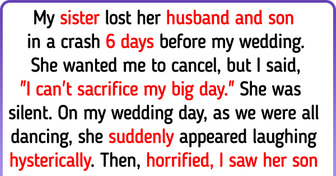
12 People Who Felt Disgusted in the Most Eerie Way
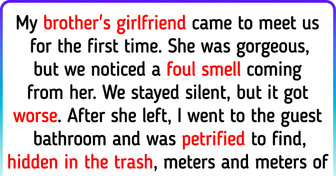
My Child Scared His Therapist, and What the Doctor Discovered Was Truly Shocking
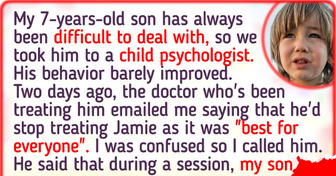
I Asked for a Raise After 10 Years and Lost My Job — They Didn’t See My Next Move Coming
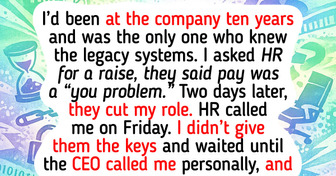
I Refuse to Split My Inheritance Evenly Between My Grandchildren—My Son Is Furious
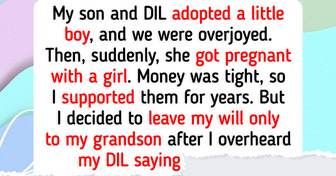
I Refused to Babysit My Sister’s Kids for Free, Now My Whole Family Is Against Me
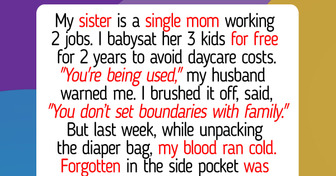
I Refused to Let My 32-Year-Old Daughter Live With Me Rent Free—Until She Told Me the Real Reason
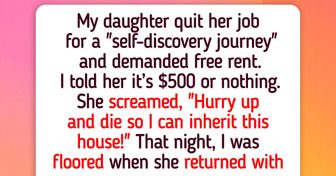
I Lost a $120K Job Over a Ridiculous Interview Test

I Refuse to Cook Vegan Meals for My Stepson—And It Turned Into a Nightmare
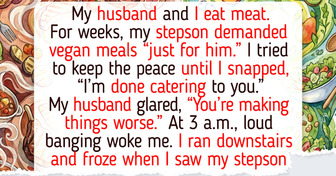
I Trained the New Hire Who Took My Promotion—My Revenge Was Calculated
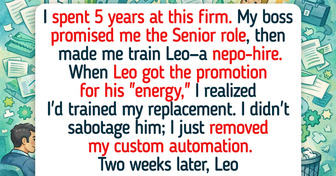
My Parents Wanted a ‘Family Vacation’ on My Budget—I Made One Move They Didn’t Expect
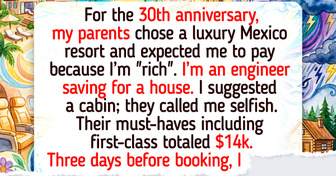
16 Men Who Proved True Love Isn’t About Big Words, but About Quiet Actions That Melt the Heart
